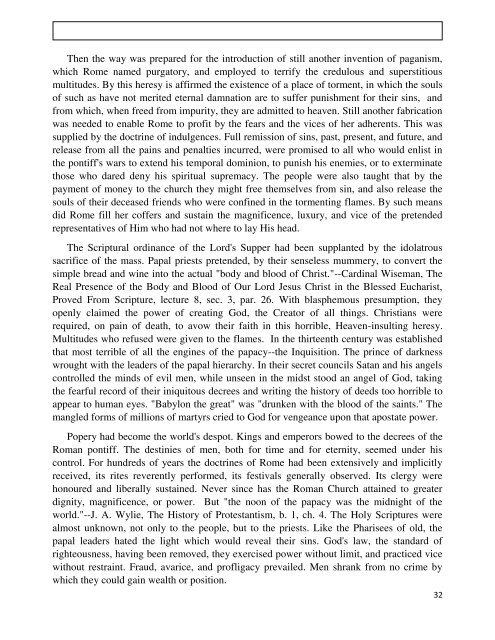Finishing the Race
Of all the games instituted among the Greeks and the Romans, the races were the most ancient and the most highly esteemed … The contests were governed by strict regulations, from which there was no appeal. Those who desired their names entered as competitors for the prize had first to undergo a severe preparatory training. Harmful indulgence of appetite, or any other gratification that would lower mental or physical vigour, was strictly forbidden. For one to have any hope of success in these trials of strength and speed, the muscles must be strong and supple, and the nerves well under control. Every movement must be certain, every step swift and unswerving; the physical powers must reach the highest mark.
Of all the games instituted among the Greeks and the Romans, the races were the most ancient and the most highly esteemed … The contests were governed by strict regulations, from which there was no appeal. Those who desired their names entered as competitors for the prize had first to undergo a severe preparatory training. Harmful indulgence of appetite, or any other gratification that would lower mental or physical vigour, was strictly forbidden. For one to have any hope of success in these trials of strength and speed, the muscles must be strong and supple, and the nerves well under control. Every movement must be certain, every step swift and unswerving; the physical powers must reach the highest mark.
Create successful ePaper yourself
Turn your PDF publications into a flip-book with our unique Google optimized e-Paper software.
Then <strong>the</strong> way was prepared for <strong>the</strong> introduction of still ano<strong>the</strong>r invention of paganism,<br />
which Rome named purgatory, and employed to terrify <strong>the</strong> credulous and superstitious<br />
multitudes. By this heresy is affirmed <strong>the</strong> existence of a place of torment, in which <strong>the</strong> souls<br />
of such as have not merited eternal damnation are to suffer punishment for <strong>the</strong>ir sins, and<br />
from which, when freed from impurity, <strong>the</strong>y are admitted to heaven. Still ano<strong>the</strong>r fabrication<br />
was needed to enable Rome to profit by <strong>the</strong> fears and <strong>the</strong> vices of her adherents. This was<br />
supplied by <strong>the</strong> doctrine of indulgences. Full remission of sins, past, present, and future, and<br />
release from all <strong>the</strong> pains and penalties incurred, were promised to all who would enlist in<br />
<strong>the</strong> pontiff's wars to extend his temporal dominion, to punish his enemies, or to exterminate<br />
those who dared deny his spiritual supremacy. The people were also taught that by <strong>the</strong><br />
payment of money to <strong>the</strong> church <strong>the</strong>y might free <strong>the</strong>mselves from sin, and also release <strong>the</strong><br />
souls of <strong>the</strong>ir deceased friends who were confined in <strong>the</strong> tormenting flames. By such means<br />
did Rome fill her coffers and sustain <strong>the</strong> magnificence, luxury, and vice of <strong>the</strong> pretended<br />
representatives of Him who had not where to lay His head.<br />
The Scriptural ordinance of <strong>the</strong> Lord's Supper had been supplanted by <strong>the</strong> idolatrous<br />
sacrifice of <strong>the</strong> mass. Papal priests pretended, by <strong>the</strong>ir senseless mummery, to convert <strong>the</strong><br />
simple bread and wine into <strong>the</strong> actual "body and blood of Christ."--Cardinal Wiseman, The<br />
Real Presence of <strong>the</strong> Body and Blood of Our Lord Jesus Christ in <strong>the</strong> Blessed Eucharist,<br />
Proved From Scripture, lecture 8, sec. 3, par. 26. With blasphemous presumption, <strong>the</strong>y<br />
openly claimed <strong>the</strong> power of creating God, <strong>the</strong> Creator of all things. Christians were<br />
required, on pain of death, to avow <strong>the</strong>ir faith in this horrible, Heaven-insulting heresy.<br />
Multitudes who refused were given to <strong>the</strong> flames. In <strong>the</strong> thirteenth century was established<br />
that most terrible of all <strong>the</strong> engines of <strong>the</strong> papacy--<strong>the</strong> Inquisition. The prince of darkness<br />
wrought with <strong>the</strong> leaders of <strong>the</strong> papal hierarchy. In <strong>the</strong>ir secret councils Satan and his angels<br />
controlled <strong>the</strong> minds of evil men, while unseen in <strong>the</strong> midst stood an angel of God, taking<br />
<strong>the</strong> fearful record of <strong>the</strong>ir iniquitous decrees and writing <strong>the</strong> history of deeds too horrible to<br />
appear to human eyes. "Babylon <strong>the</strong> great" was "drunken with <strong>the</strong> blood of <strong>the</strong> saints." The<br />
mangled forms of millions of martyrs cried to God for vengeance upon that apostate power.<br />
Popery had become <strong>the</strong> world's despot. Kings and emperors bowed to <strong>the</strong> decrees of <strong>the</strong><br />
Roman pontiff. The destinies of men, both for time and for eternity, seemed under his<br />
control. For hundreds of years <strong>the</strong> doctrines of Rome had been extensively and implicitly<br />
received, its rites reverently performed, its festivals generally observed. Its clergy were<br />
honoured and liberally sustained. Never since has <strong>the</strong> Roman Church attained to greater<br />
dignity, magnificence, or power. But "<strong>the</strong> noon of <strong>the</strong> papacy was <strong>the</strong> midnight of <strong>the</strong><br />
world."--J. A. Wylie, The History of Protestantism, b. 1, ch. 4. The Holy Scriptures were<br />
almost unknown, not only to <strong>the</strong> people, but to <strong>the</strong> priests. Like <strong>the</strong> Pharisees of old, <strong>the</strong><br />
papal leaders hated <strong>the</strong> light which would reveal <strong>the</strong>ir sins. God's law, <strong>the</strong> standard of<br />
righteousness, having been removed, <strong>the</strong>y exercised power without limit, and practiced vice<br />
without restraint. Fraud, avarice, and profligacy prevailed. Men shrank from no crime by<br />
which <strong>the</strong>y could gain wealth or position.<br />
32
















